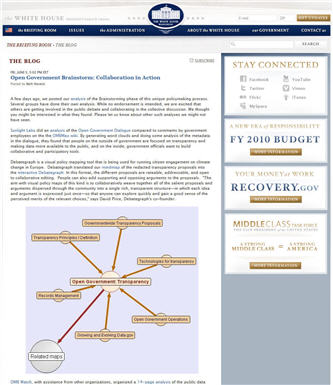Collaborative Democracy in the White House
If you have been following the White House’s groundbreaking Open Government Initiative over the past few weeks, you’ll be aware already that Debategraph has been mapping the proposals emerging from the Open Government Brainstorming sessions on Participation, Transparency and Collaboration.

The Open Government Initiative moved into the third, and most significant, Drafting phase today—and we’re delighted to note that the White House’s Open Government team has entrusted this vital phase to our favourite wiki team at MixedInk (who, if you haven’t discovered them yet, offer a truly innovative and powerful approach to the task of collaborative writing, which is ready to be applied in multiple contexts).
The initial Open Government Brainstorming and Discussion phases have been stimulating and generative, but the real collaborative work, the real collaborative responsibility, and the real collaborative opportunity lie in the next phase of synthesis.
So get writing!
…and, to help you on your way, here’s the combined Debategraph of the redacted proposals from the three brainstorming sessions:
Mapping the Crisis in Gaza
As the What Should Obama Do Next? map began to address the unfolding events in Gaza last week, it was soon apparent that the immediate crisis and the wider Arab-Israeli conflict merited detailed consideration on a new map.
To this end, Independent readers and the Debategraph community have begun to seed a map on the crisis; including arguments raised by Robert Fisk and Johann Hari, and some of the questions and answers from the Twitter press conference organised last week by the Consulate General of Israel in New York.
The Gaza map (above)—which will require significant iteration and community input from a wide range of voices to reach maturity—is motivated by two medium-term objectives:
(1) to present the different worldviews that underpin the conflict fairly and succinctly on a common map.
(2) to map creatively and constructively the options open to the participants in the conflict and the international community, and the arguments for and against the different options.
This is an emotive subject, and the map is at an early stage of development; so if you see statements with which you disagree strongly or spot gaps in the arguments, please help us to address these on the map.
After logging-in, anyone can add new issues, positions and arguments, edit and restructure the map, and evaluate the different arguments; so the whole structure evolves as new perspectives are added to the map.
Hence, every aspect of the map at this stage should be regarded as mutable and provisional—with the aim being to enrich the structure iteratively and collaboratively until the map reflects a maximum of community intelligence.
As with the Obama map, you can also keep up to date with developments on the Gaza map via @TheIndyDebate on Twitter.
Cross posted at: Independent Minds
![Reblog this post [with Zemanta]](https://img.zemanta.com/reblog_e.png?x-id=c96fd920-9824-4bd0-9a88-895db173720b)

